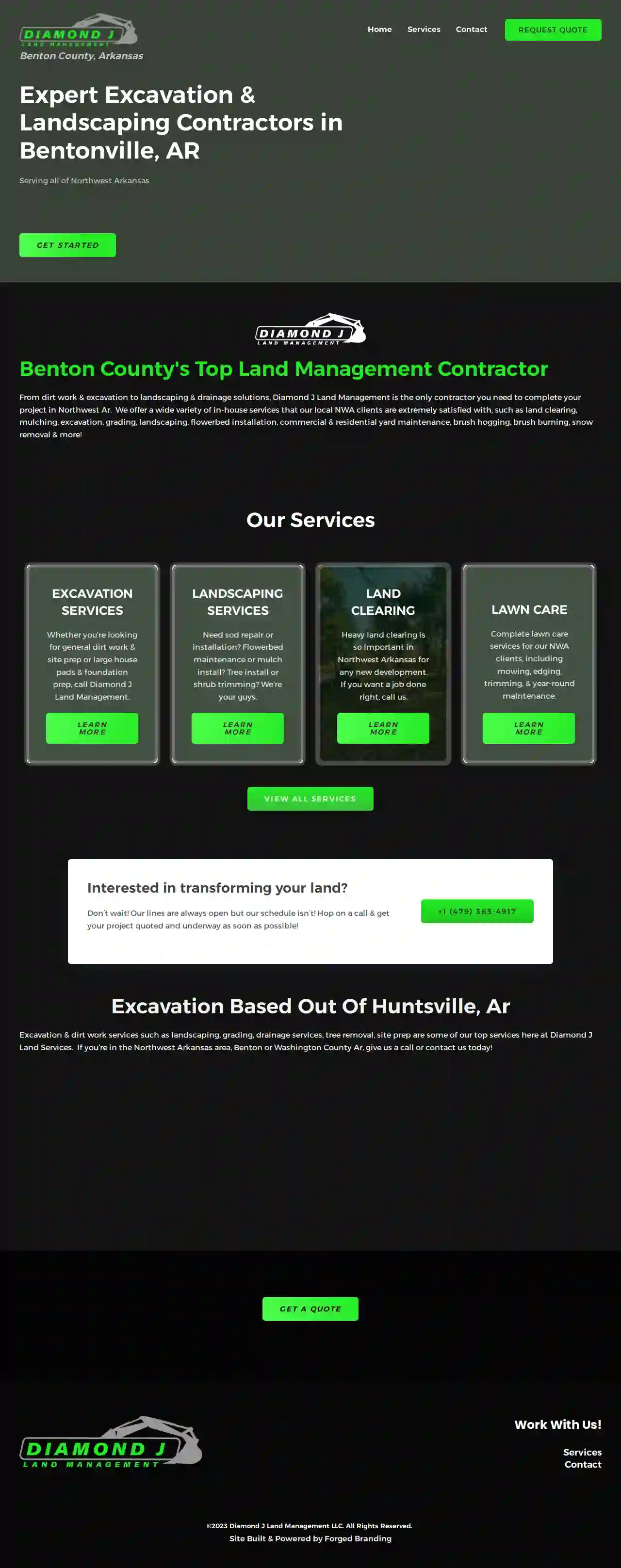Demolition Contractors Fayetteville
Find Demolition Company Near Me in Fayetteville
Get 3 FREE Demo Contractor quotes for your project today! Compare profiles, reviews, accreditations, portfolio, etc... and choose the best service.

GNG Underground
57 reviewsRogers, USWelcome to GNG Underground Professional Excavation, Utility Trenching, and Landscaping Services for Northwest Arkansas Safety & Quality Service, Always our Priority Serving all of Northwest Arkansas Welcome to GNG Underground, providing experienced excavation and landscaping services for NWA GNG is a Veteran-Owned excavation company, based in Bella Vista and serving all of Northwest Arkansas GNG Underground is a multi-faceted excavating and landscaping company in Northwest Arkansas. From clearing land for your new project to installing storm shelters and septic tanks and propane tanks, GNG has you covered. We are your go-to outdoor utility company. We take pride in the quality of our work and the projects we complete for our clients. We offer a wide variety of outdoor excavation services in Northwest Arkansas so that when you need something done on your property, you know that you can call the trusted excavators at GNG Underground.
- Services
- Why Us?
- Gallery
Get Quote
Lukas Excavation and Demolishing
53 reviewsHot Springs, USAbout Us Licensed And Insured We are a State Licensed Excavation Contractor in Arkansas and Professionally Insured which puts us into the seat of responsibility and requires professionalism for every job we do. Prompt and Reliable We follow Arkansas State Laws and Industry Guidelines as a Licensed Excavation Contractor to complete your job promptly and reliably. We check with all Arkansas underground utility service providers before we dig to assure safety to ourselves and our customers. Satisfaction Guaranteed We strive to do every job as if we were the customer so there is complete satisfaction when the job is done. We provide excavation services in Montgomery County, Yell County, Hot Springs County, Pulaski County, Polk County, Saline County, Garland County, Pike County, Arkansas, Hot Springs, Hot Springs Village, Little Rock, North Little Rock, Malvern, Sims, Story, Mt. Ida, Mena, Russellville, Benton, Bryant, Bismarck, Maulmelle, Sherwood, Booneville, Danville, Searcy, Conway, Pine Bluff, Sheridan and many other cities within Arkansas.
- Services
- Why Us?
- Gallery
Get Quote
Arrow Dirt Works
511 reviewsRogers, US- Services
- Why Us?
Get Quote
Les Rogers Excavating & Materials
3.834 reviews1000 Wellington Rd, Stratford, N0B 2L0, USAbout Les Rogers Inc. Les Rogers Inc. is a family-owned and operated business with over 30 years of experience in the construction industry. We are committed to providing our clients with high-quality workmanship and exceptional customer service. Our team of skilled professionals is dedicated to delivering projects on time and within budget. We specialize in a wide range of construction services, including: Residential construction Commercial construction Renovations Additions Custom homes At Les Rogers Inc., we believe in building strong relationships with our clients. We take the time to understand your needs and goals, and we work closely with you throughout the entire construction process. We are committed to providing you with a positive and stress-free experience. Contact us today to learn more about our services and to schedule a free consultation.
- Services
- Why Us?
Get Quote
Diamond J Land Management
1Rogers, US- Services
- Why Us?
Get Quote
Over 3,943+ Excavation Companies onboarded
Our excavation contractors operate in Fayetteville & beyond!
ExcavationHQ has curated and vetted the Best Excavation Contractors arround Fayetteville. Find a top & trustworthy pro today.
Frequently Asked Questions About Demolition Contractors
- Project Assessment: The demolition contractor evaluates the structure, site conditions, and project requirements.
- Permitting: Obtain necessary demolition permits from local authorities.
- Site Preparation: Secure the site, disconnect utilities, and remove any valuable or reusable items.
- Hazardous Material Abatement: Professionally remove asbestos, lead paint, or other hazardous materials if present.
- Demolition: Execute the chosen demolition method, bringing down the structure safely and efficiently.
- Debris Removal and Site Cleanup: Sort, process, and dispose of demolition debris responsibly. Clean up the site to prepare it for future use.
- Dust Suppression: Use water spraying, misting systems, or other dust suppression techniques to control airborne particles.
- Noise Barriers: Erect temporary noise barriers around the demolition site to reduce noise transmission to nearby properties.
- Work Schedule: Schedule noisy demolition activities during permitted hours to minimize disturbance to neighbors.
- Communication: Keep neighbors informed about the demolition schedule and any potential disruptions.
What are the steps involved in a typical demolition process?
What is the difference between demolition and deconstruction?
Demolition: Typically involves bringing down a structure quickly and efficiently, often using heavy machinery and potentially explosives. The primary goal is to clear the site.
Deconstruction: Focuses on carefully dismantling a building piece by piece to salvage reusable materials. It prioritizes minimizing waste and environmental impact, often involving manual labor and specialized tools.
The choice between demolition and deconstruction depends on the project's objectives, budget, and environmental considerations.
How can I minimize the dust and noise from demolition?
How can I tell if my building contains asbestos?
What are the steps involved in a typical demolition process?
- Project Assessment: The demolition contractor evaluates the structure, site conditions, and project requirements.
- Permitting: Obtain necessary demolition permits from local authorities.
- Site Preparation: Secure the site, disconnect utilities, and remove any valuable or reusable items.
- Hazardous Material Abatement: Professionally remove asbestos, lead paint, or other hazardous materials if present.
- Demolition: Execute the chosen demolition method, bringing down the structure safely and efficiently.
- Debris Removal and Site Cleanup: Sort, process, and dispose of demolition debris responsibly. Clean up the site to prepare it for future use.
What is the difference between demolition and deconstruction?
Demolition: Typically involves bringing down a structure quickly and efficiently, often using heavy machinery and potentially explosives. The primary goal is to clear the site.
Deconstruction: Focuses on carefully dismantling a building piece by piece to salvage reusable materials. It prioritizes minimizing waste and environmental impact, often involving manual labor and specialized tools.
The choice between demolition and deconstruction depends on the project's objectives, budget, and environmental considerations.
How can I minimize the dust and noise from demolition?
- Dust Suppression: Use water spraying, misting systems, or other dust suppression techniques to control airborne particles.
- Noise Barriers: Erect temporary noise barriers around the demolition site to reduce noise transmission to nearby properties.
- Work Schedule: Schedule noisy demolition activities during permitted hours to minimize disturbance to neighbors.
- Communication: Keep neighbors informed about the demolition schedule and any potential disruptions.